Graham Linehan, an anti-transgender activist, makes a living out of libeling, insulting, and stirring up hate against members of the trans community. This puts him in flagrant violation of Substack’s Terms of Use. Substack’s repeated failure to do anything about this problem creates the impression that they are willing to bend the rules in favor of anti-trans hate speech.
I’m writing this today, as the inaugural post of THE WAZZOCK’S REVIEW, my new twice-weekly publication for Substack. I was given the opportunity to write this journal on a Substack Pro contract, about which I cannot say more. Before I signed, I wanted to be sure that the contract did not prevent me from asserting full editorial independence. I am so satisfied, and so I am using the privilege of that independence to say to Hamish, Chris, and Jairaj: you have mishandled the Linehan affair, and you should set it right quickly.
Before I walk through the case against Linehan, I want to make a point of contrast with Jesse Singal, another anti-transgender campaigner and journalist whose own Substack Pro contract has been a matter of controversy in recent weeks [“stealth edit,” whatever that means: this apparently isn’t true––apparently Singal makes his money from direct grifting, the old fashioned way]. Singal’s work has been roundly criticized by trans critics (including me) for inaccuracies in reporting, and for a general bias against trans people. My thread on this subject is here.
Some of Singal’s writing on trans issues skirts the line of between robust debate and hate speech. He has referred to trans people as a “contagion”; his followers regularly misgender trans people (yesterday it was my husband Danny’s turn); and his tenacity prosecuting a one-man battle against trans people in media sometimes seems to border on the deranged. When Foreign Policy published an essay criticizing British anti-transgender campaigners and the decision in Bell vs. Tavistock, Singal responded by saying that I had never read the decision, demanded that Foreign Policy take down my essay, and eventually pestered their editors, who rejected a majority of his complaints but added three misleading “corrections”—one of which is a plain error of fact. Having failed in his quest to get my piece withdrawn, and with most of his criticisms rejected, Singal claimed victory in his campaign against me—which takes stones, for a guy who makes a podcast criticizing something called “cancel culture.”
[Edited: 3.52pm. True to form, here comes Jesse Singal, emailing me to ask me to “correct” two claims in the above paragraph. The first correction he requests is as follows: “I didn’t and would never refer to trans people as a ‘contagion.’ I wrote that some parents believe their kids’ gender exploration may be a result, at least in part, of social contagion. Then I explained why trans activists find this offensive, then I explained why there’s some evidence it’s true, quoting an experienced clinician, a trans boy, and a former trans girl.” Please do see how convincing you find that account here, or also just note the formulation of “I explained trans people were contagious, then explained why people find that offensive, then showed why it’s true.” Happy to “correct,” Mr. Singal.
The second “correction” he asks for is that he claims that he never called for the withdrawal of my Foreign Policy essay. He said “it should never have been published.” You can split that hair too.
Jesse has yet to answer the question that I have put to him several times: does he or does he not believe that Linehan’s conduct on Substack violates the terms of use?]
I won’t reciprocate. While it isn’t impossible to imagine Singal stooping to mere hatred and personal libels, nothing he has done so far looks to me like grounds for deplatforming. Moreover, a persistent rumor that Singal has sexually harassed scores of trans women in their Twitter DMs––though no screenshot of such harassment has ever been made public––appears likely false, and based on a misunderstanding. When he feels harmed by trans women (which he often does), Jesse Singal can respond with long, unwelcome diatribes, which are often made in private. I have experienced this habit of Singal’s myself. It was challenging, and exhausting, but it did not feel sexually motivated to me.
It’s important to say these things directly, because Linehan and the many like him are currently hiding behind Singal. If we are serious about confronting the very worst forms of bigotry, we need to get better at distinguishing between different classes of opposition. Jesse Singal is a dolt, but Graham Linehan is a menace, and Substack writers and readers need to be protected from his harassment, abuse, and threats.
* * *
So, the case against Linehan. I’m going to make this argument solely on the basis of his attacks on me, but this is not because this matter comes down to personal beef—it is simply because the libels and slurs he directs against other people are so vile, that I do not wish to repeat them. Linehan’s treatment of me is by no means unusual, as a cursory glance at his own Substack newsletter will confirm.
I’ve told this story so many times, it’s laborious to rehearse it once more. So let me repeat that my story with Linehan is by no means unusual: on the contrary, he has done things like this to dozens of trans people.
On May 7th, 2020, Graham Linehan accused me of “grooming” my students at UC Berkeley.
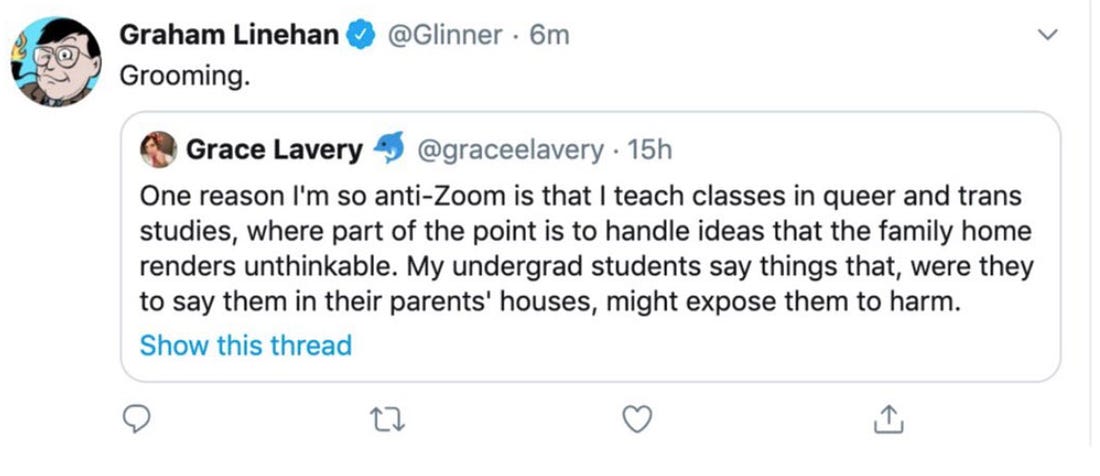
He then, on Twitter, suggested that I wanted to teach “away from the prying eyes of parents” for nefarious purposes:
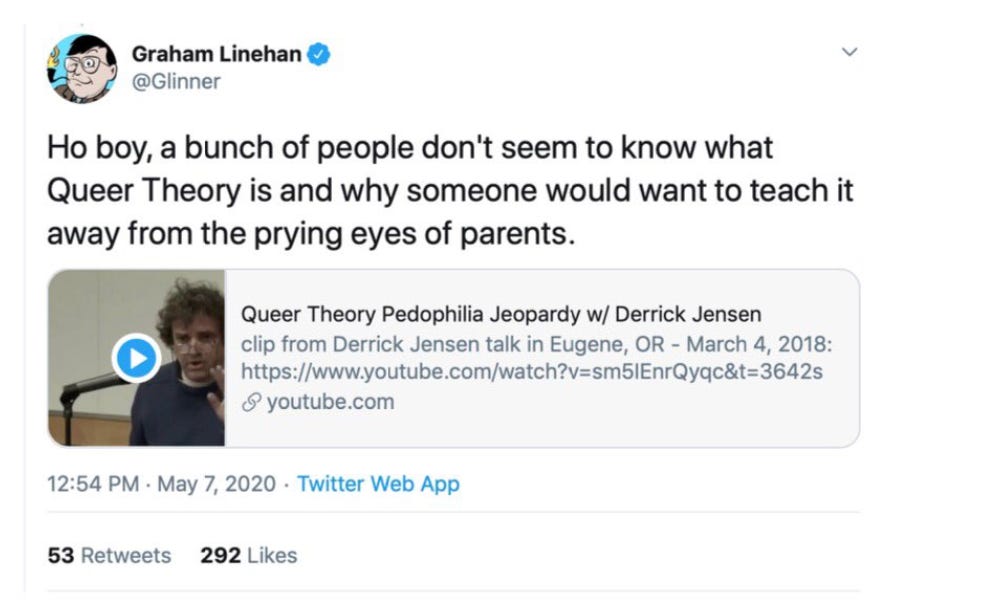
Finally, on the same day, he referred to queer theory––a branch of the humanities dealing with the cultures and histories of LGBT people––as “paedophilia”:
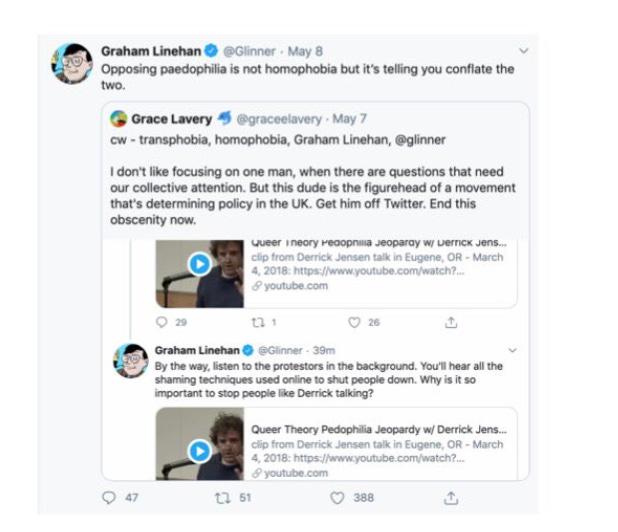
I contacted Twitter about these tweets: moderators agreed that they were inflammatory and libelous, and took them down. Linehan’s Twitter account was closed as a result––though he falsely claimed (before the UK Parliament!) to have been censured for a relatively harmless barb he lobbed at the Women’s Institute.
To say that the stress of being linked to pedophilia publicly, and being subject to a swarming hate campaign of hundreds of Linehan’s minions, was overwhelming, would be an understatement. All the more so since, at the very same time, my husband and I were engaged in a high-profile campaign for child protection and safeguarding in evangelical churches. To this day, I get hate mail, including accusations of being a “nonce,” from Linehan’s supporters, and I have been subject to an ongoing campaign to get me fired from UC Berkeley––waged by the same people who talk with such pained frankness about “cancel culture.”
I recently brought myself to watch the video which Linehan kept sharing, of one Derrick Jensen, attempting to discredit queer theory via some reprehensible remarks the French gay writers Michel Foucault and Guy Hocquenghem made about child sexuality in the 1970s. Jensen’s attempt to discredit two of the most important French gay voices of the twentieth century is the very definition of cancel culture, and warrants no engagement. But a further irony is that all I had said was that I taught queer theory (which I do), not that I, personally, accepted every aspect of it (which I don’t). Queer theory has absolutely nothing to do with advocacy of child abuse, but it’s an open question as to whether my own work has much to do with queer theory: I’ve written two essays critical of some of the method’s fundamental principles, “Grad School as Conversion Therapy,” and “Egg Theory’s Early Style.”
After having been booted off Twitter, Linehan took to Substack, where he reiterated that he “still believe[s]” my teaching method is a form of “grooming,” because queer theory “ha[s] to do with blurring boundaries and pedophilia.”
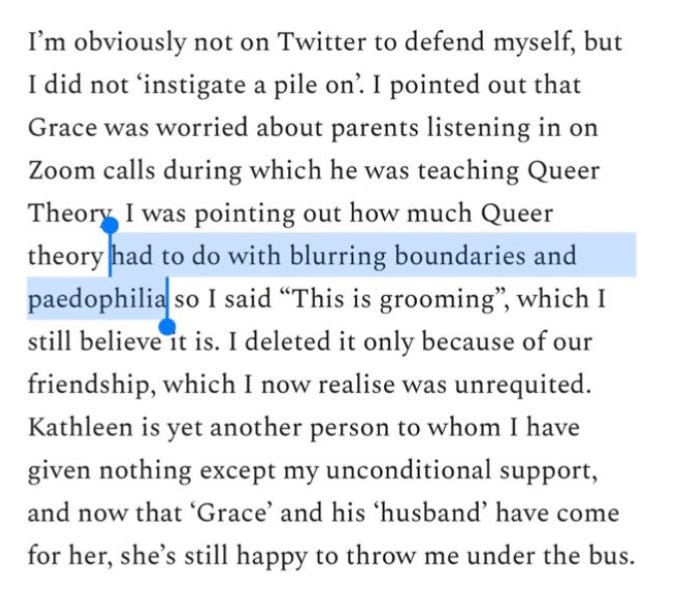
You will notice that this formulation itself blurs a boundary, between the advocacy of pedophilia and the practice of it. I am guilty of neither, but having persuaded his readers of the first charge, he moves on to the second without difficulty. By December, Linehan was offering even cheaper slurs, such as that I must “really enjoy pornography”:
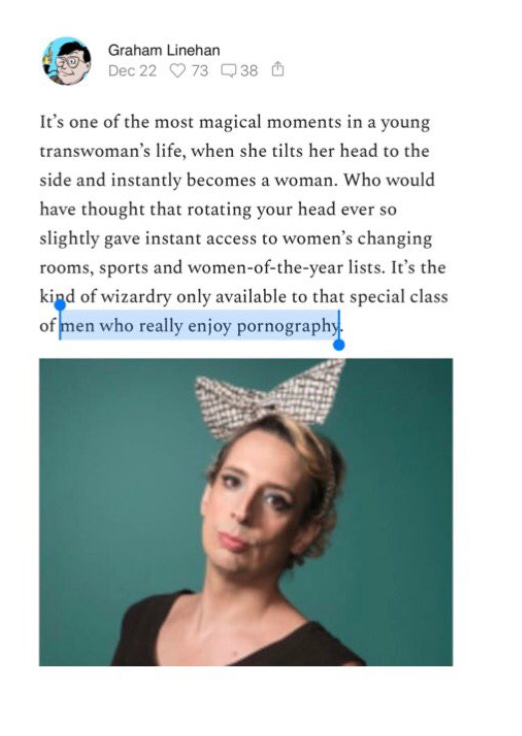
…which, as it goes, I don’t. Earlier this month, Linehan wrote “I stand by everything I’ve written about Lavery” calling me “dangerous AND comical.”

While he clarifies “I didn’t mean to suggest that Lavery is a paedophile”––he three times uses the same awkward formulation to create just that impression:



And of course, his Substack followers knew exactly what he meant:
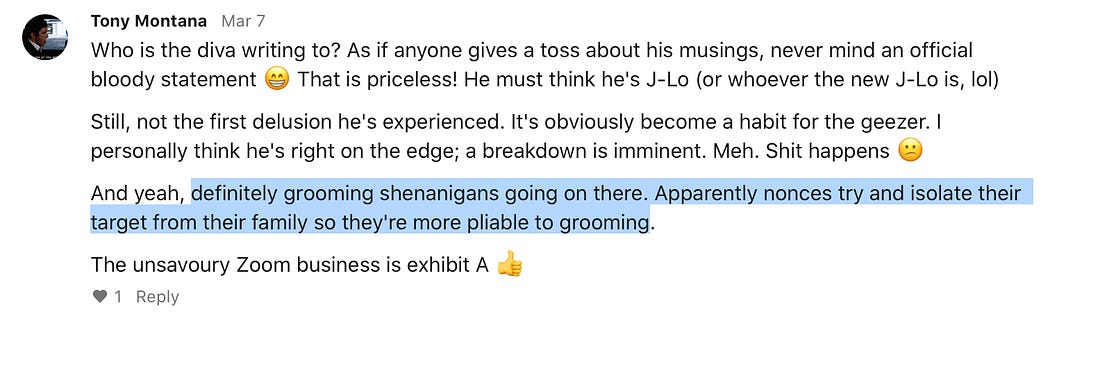
One of the core purposes of a college education is to give students––young adults––opportunities to explore ideas in their own terms, without direct supervision from their families. That is not to say that families of origin are necessarily hostile to the interests of LGBT students––though plenty are––but that education means developing one’s own ideas, one own’s commitments. To cast that as simply the product of predatory designs on the part of educators would be cruel, stupid, and misguided.
However, it would also be fair comment. That isn’t what Graham Linehan has done. Graham Linehan has waged a campaign, on multiple platforms, to convince his readers that I in particular am a pedophile. They believe him; and as a result I receive hateful, daily harassment. That is wrong, and those who care about “detoxifying” the debate around trans civil rights should have the courage to say so.
* * *
In December, I contacted Substack to complain about Linehan’s remarks about me, which I held to be libelous, and therefore censurable under the Publisher Agreement (PA):
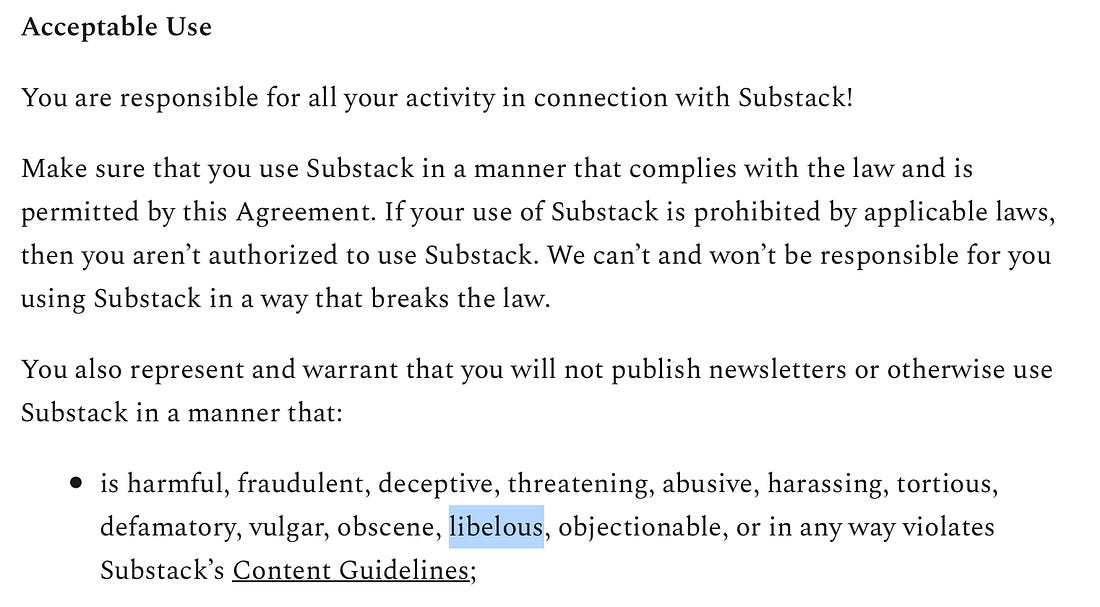
They responded that while, of course, they did not believe I was “grooming” my students, nonetheless they were not a courtroom, and could not determine whether or not it was a libel. The implication was that Substack would only remove posts that had already been deemed libelous in court. If that’s all the PA means, the company should be clear about that––indeed, no such document would be necessary, since compliance is assumed.
The section of the Terms of Use (TOU) also includes Content Guidelines, linked to in the PA section excerpted above. Of particular interest here is the prohibition of “hate,” which they define as “serious attacks on people based on their race, ethnicity, national origin, religion, sex, gender, sexual orientation, age, disability or medical condition.”

Clearly, Linehan’s attack on me is serious. But is it “based on” my sex, gender, or sexual orientation? Yes, self-evidently it is.
Linehan’s own defense is that contemporary scholars in a field of study deriving from two French gay men is irreparably damaged because of remarks those men made decades ago about childhood sexuality. That defense is homophobic on its face: it is very obviously a “serious attack” based on the presumed “sexual orientation” of practitioners of queer theory.
It is also, transparently, false. Foucault’s work on the history of sexuality is certainly influential in queer theory, but no more than in any other number of fields: he is one of the most influential historian of the last century. Hocquenghem is read less frequently today, but his emphatic advocacy of gay identity (not queer) would be temperamentally hard to reconcile with queer theory. I would guess that literally not a single person who works in queer theory today would agree with Foucault’s or Hocquenghem’s views on child consent. Of course I do not, and until Linehan nobody I had ever encountered had ever made this outlandish and disturbing connection.
I am wary of walking through the falseness of Linehan’s “argument,” because it is very clear that Linehan neither knows nor cares anything about the subject. His goal is to smear trans people as pedophiles, and he believes that connecting me to Foucault and Hocquenghem will get him there. It is a truly disgusting move. The only basis for such a move is that I am a trans woman, a class of person whom Linehan thinks contemptible, malicious, and undeserving of civil rights.
It is difficult to think of a more straightforward example of hateful speech act than referring to someone as a pedophile on the basis of their being gay or transgender. This should not, therefore, be a difficult case for Substack. There is no risk of throwing a baby out with this particular trough of sludge. Graham Linehan should not be able to monetize his hatred of trans people, and Substack should not enable him to do so.
For all of the scapegoating of trans people for cancel culture, often among the more successful adherents of the Substack model (Singal, Glenn Greenwald, Andrew Sullivan, and others), the truth is that the Linehan-like style of vicious, personal attacks on trans people, especially trans women, is the norm rather than the exception. It’s no surprise that trans people online often blame people like Singal and Greenwald for spreading hate, when they profit––directly and indirectly––from the tactics of people like Linehan. And until those people draw a line between their own views and those of the bigots, it is reasonable to assume that they all stand together.
(Gosh––yesterday Jesse Singal actually published a piece calling Linehan a “transphobe,” and referred to his conduct against me as “disgusting.” Credit where credit’s due: bravo. Would be good to see similar backbone from Greenwald, Sullivan, and the others.)
Substack’s media model offloads all editorial responsibility, and most of the financial reward, onto writers. It is a complex idea, and has many advantages over traditional media, while posing particular challenges. Obviously, it has served me well––hence my relaunching my newsletter after a year or so of dormancy. But in order to work as an environment receptive to a diversity of opinion, Substack needs to enforce its own TOU. As the Substack owners recognize, that project depends upon an ability to distinguish between “guard[ing] against harassment” and “censorship.”

Linehan harassed trans women on Substack, and he should not be able to poison this community, nor to draw a profit, from his hatred. Freedom of expression is important, and open access is worth fighting for. So are the rights of discussants to talk about complex and controversial topics without being exposed to harm.
So close Graham Linehan’s Substack now.
Update, 03/24/21, 2.45pm: Substack just sent around an email explaining their moderation policy. Though they don’t mention Graham Linehan my post specifically, I kind of think they’re thinking about me, because of this slightly wobbly moment:

Now, this is a bit odd. The headline is “we do not allow harassment or threats,” a formulation that quite clearly suggests the two are different. They do not say, for example “we do not allow for harassment (ie, threats).” So using “threatening violence” as a definitor of “harassment” makes no sense at all.
The decision that Substack wants to avoid making is a difference between fair comment and harassment. Unfortunately for them, since the Substack terms of use explicitly prohibit harassment, they cannot avoid making that determination.
So what does the word mean? I’m sure some lawyers have more precise ideas than me, but here’s a quick google result:
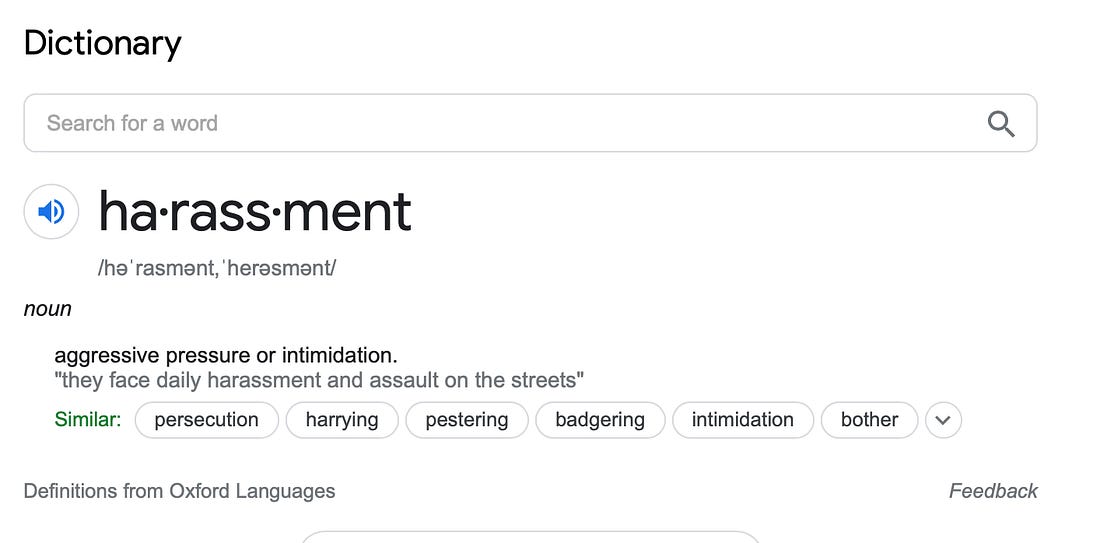
Is Linehan aggressive? Does he apply pressure? Does he aim towards intimidation? Yes, yes, and yes.
The statement from Substack also fails to respond to my point about libel. Is it truly the case that Substack will only judge a statement to be libelous if directed to do so by a court? If so, they should make that clear.
∿
